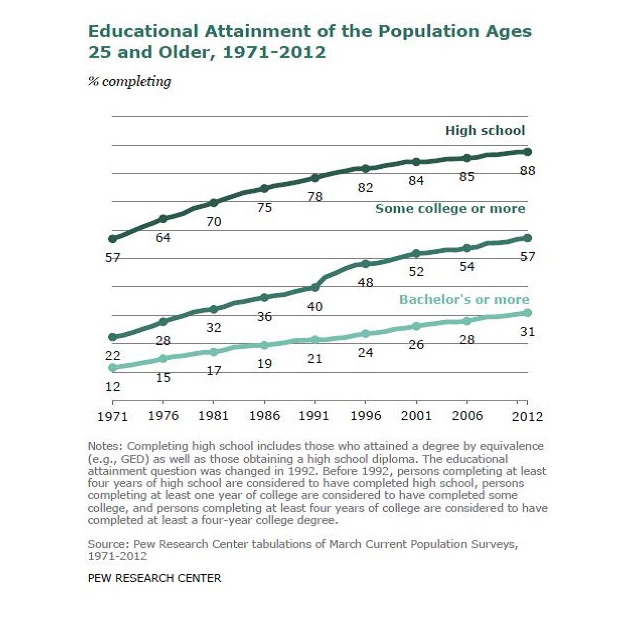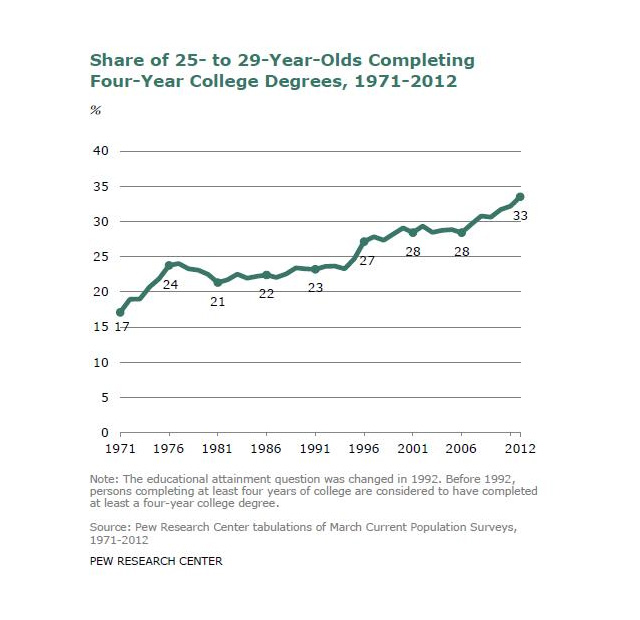Americans Are More Educated Than Ever--But It's Still Not Enough
 A recent report by Pew Social Trends reveals some happy news: educational attainment in America has increased to record highs across all levels. Since 1971, the percentage of Americans who have completed high school rose from a meager 57% to 88%. The percentage of Americans with some college education increased from 22% to 57%, and the percentage of Americans with a bachelor's degree or more has nearly tripled: 12% to 31%. These figures are the highest on record, and indicate that America is now the most educated it's ever been.
A recent report by Pew Social Trends reveals some happy news: educational attainment in America has increased to record highs across all levels. Since 1971, the percentage of Americans who have completed high school rose from a meager 57% to 88%. The percentage of Americans with some college education increased from 22% to 57%, and the percentage of Americans with a bachelor's degree or more has nearly tripled: 12% to 31%. These figures are the highest on record, and indicate that America is now the most educated it's ever been. So, pop open the champagne bottle and celebrate, right? Well, unfortunately, it's not as simple as that.
So, pop open the champagne bottle and celebrate, right? Well, unfortunately, it's not as simple as that.Supply and Demand
The U.S.A.'s increased level of educational attainment is a testament to our successful development of mass higher education, and is indeed cause for celebration. However, there are other factors at work here; namely, the supply of college-educated workers versus the demand for college-educated workers in our skill-driven economy. We're simply not producing enough college-educated individuals, which could exacerbate problems of income inequality across the nation.
According to a recent study by Georgetown University's Center on Education and the Workforce, the supply of college-educated workers has slowed significantly since 1990 (3.1% growth down to 1.5% growth), while demand for these workers has remained consistent. The result is a growing deficit of college-educated workers.
 What happens in the marketplace when supply of a product is less than its demand? Simple: prices go up. The same is true for the labor market. College-educated workers are in short supply, so employers have to bid up their wages. This creates a widening gap between the wages of Americans of different educational attainment. This is a big cause of income inequality. Right now, workers with a bachelor's degree or more earn an average of 74% more than workers with only a high school diploma. If we continue to produce the same amount of college graduates, this "wage premium" of college-educated workers will increase to 96% in little more than a decade.
What happens in the marketplace when supply of a product is less than its demand? Simple: prices go up. The same is true for the labor market. College-educated workers are in short supply, so employers have to bid up their wages. This creates a widening gap between the wages of Americans of different educational attainment. This is a big cause of income inequality. Right now, workers with a bachelor's degree or more earn an average of 74% more than workers with only a high school diploma. If we continue to produce the same amount of college graduates, this "wage premium" of college-educated workers will increase to 96% in little more than a decade.The Georgetown study goes on to suggest a solution: take a much more aggressive approach to producing college-educated workers. To narrow that unacceptably wide income gap to 46%, we would need to add 20 million postsecondary-educated workers to the workforce in the next 15 years. At our current rate, we're only expected to add 8 million. To add that extra 12 million educated workers would require reducing college costs and making sure everyone who wants to earn a college degree has the resources to do so. This is especially true for Hispanic and black youth, whose college completion rates are far below those of Asian and white youth.
The undersupply of college-educated workers is a significant problem facing our nation. By aggressively producing college-educated workers, we could reverse the growth of income inequality, raise our level of educational attainment to that of other developed nations, and meet our economy's growing demand for efficiency.
About
Privacy Policy
Contact Us
Submit a Resource
